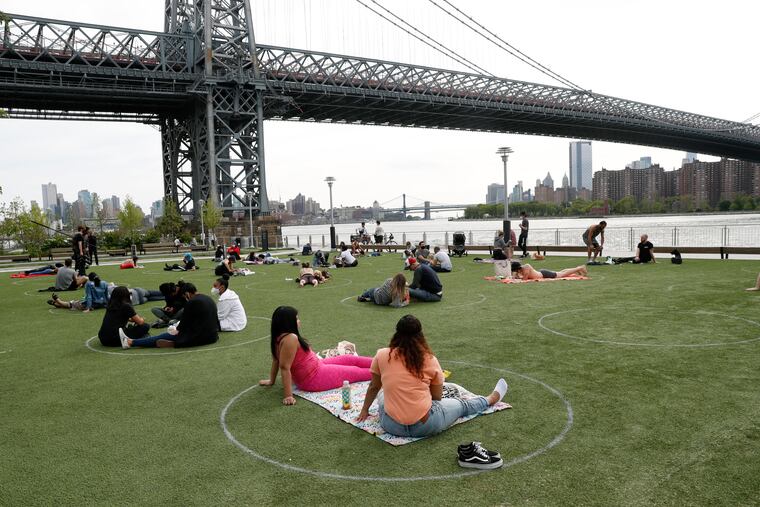Why not add social distancing circles like NYC’s to Philly parks? | Opinion
"Human parking spots" in parks are one more way we can help ensure that everyone, not just those with cars or yards, has access to green space during the pandemic.

If you’ve taken advantage of the now open MLK Drive at Fairmount Park, or a nature trail like the Wissahickon — you’re one of the lucky ones.
As the weather warms up, and as more people feel confident enough to venture out of being cooped up in our houses, folks are looking for any connection to the great outdoors they can get. If you’re one of the roughly one-third of Philadelphians in a household without a car and live in poverty, this challenge can lead to not only a lack of recreation, but mental health benefits as well. When you consider that not everyone has air-conditioning, and the hotter days to come, the situation becomes dire.
For those without personal vehicles who are avoiding public transportation during the pandemic, the best access to natural areas we have is our local park or more likely, recreation center fields that have been closed as per pandemic procedures.
» READ MORE: Warm weather draws risky crowds to parks. Here’s how Philly can make them safer. | Opinion
It’s even being recommended not to go to the beach because of all of the risks to the transmission and contracting of the disease through the many touchpoints from here to there (especially if traveling to New Jersey, one of the hardest-hit states in the country).
But as the lockdown procedures continue into the summer, we need creative solutions to provide equitable access to crucial green space for all Philadelphians. Park circles are one of them.
Many of you may have seen the photos of crowded parks and waterfronts full of maskless patrons — largely white, despite social distancing arrests in cities around the country targeting people of color —
and looked on with horror. But many of you may have also seen the viral images of the “human parking spots” in Brooklyn’s Domino Park, white rings spaced six feet apart on a wide lawn in order to provide guidance on where to relax, workout, or picnic — safely.
If you take a look at the photos, you’ll notice a striking fact: that folks are doing a remarkable job of “staying within the lines.” As an urban anthropologist who studies public spaces for a living, I can tell you with certainty that people will do whatever they’re able to if left to their own devices. Give us a wide-open space and while, yes, we may try to distance from other folks, we will inevitably fill in the space if given the opportunity (and good weather). Providing outlines in space that nudge the user toward “proper” behavior is a great way to not only indicate how close is close enough but also provide social pressure to conform.
» READ MORE: Coronavirus is a reminder to value parks and public spaces | Opinion
We know spending time outside is good for our health. Rather than shutting it down and banning it entirely, it’s time to recognize that with proper guidance, we can do it responsibly and ensure that our summer is safe — and maybe even fun.
Is that through “human parking spots”? Sure — why not.
The bottom line is, people are leaving their houses anyway. For some, it’s a necessary relief from a hot house. For children, it will be a crucial part of their need for play and safe socialization when school is out of session, and summer camps are inaccessible. For business owners, it provides an opportunity to promote picnicking with takeout meals, as physically distanced cafe seating will be limited. And for friends and family, it can provide a moment of relief from the lack of socialization that’s been going on for months.
» READ MORE: Safe social distancing: Should Philly close more streets to cars during coronavirus? | Pro/Con
If we’re creative enough, maybe it can even be a place for urban beaches to help relieve us from our desire to go down the Shore.
With guidance continued from Parks and Recreation, clear education rather than punitive enforcement, and helpful regulation from volunteers and friends’ groups, we can prevent the spread of the virus while providing fair access to these important public spaces for all Philadelphians. (And then maybe we’ll open more streets to pedestrians, too, while we’re at it.)
Katrina Johnston-Zimmerman is a lecturer, researcher, and advocate for humanist cities who consults through her firm THINK.urban and is an adjunct professor in urban strategy at Drexel University.